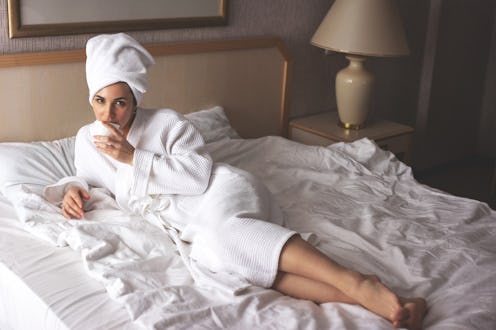(Living)
This Simple Change Can Help You Sleep Way Better At Night

There are some great debates in life that may never be reconciled: the chicken or the egg, Coke or Pepsi, polka dots or stripes. Well, there's another conundrum — morning versus nighttime showers — that may have actually been figured out. Yes, it seems hopping in the shower at night could in fact be the better decision, especially for those who value their sleep.
If you've been lacking in the sleep department, you probably have already noticed that it can affect everything from your anxiety to your metabolism. That said, it's no wonder that so many are seeking ways to achieve those seven to nine hours of deep, uninterrupted sleep they literally dream about. So for those who have already tried the usual natural sleep remedies, and have even attempted switching luxury bedding with no avail, moving shower time to the evenings is totally worth a shot — and the results are backed by science.
Sleep expert Ingrid Prueher is a major proponent of a nightly cleansing routine, and has been recommending the technique to her clients for some time now. However, if your schedule allows for it, you might want to try for a pre-bedtime bath first. "I've been recommending blissful baths to my clients for years now because it has the ability to mentally and physically relax the body thereby improving common sleep issues." And part of the reason these soaks (as opposed to a shower) can be so beneficial isn't just the warm water — it's the addition of epsom salt, which Prueher suggests adding for its detoxifying properties.
Still, baths just aren't appealing or practical for some. "Though [my clients] understand the amazing benefits that come along with taking a bath, like relaxation and removing toxins from the body, I still get push back because they feel they don't have enough time in their day to incorporate it," Prueher says. "They already have a long to-do list, adding bath time does not make the top of the priority list and it honestly seems to stress them out even more." If that describes you, a shower might be just as helpful for lulling you to sleep.
This may be a tough transition for those who are used to a morning shower to get energized for the day — but if it means waking up more well-rested, you might want to give it a try. Start by aiming for about an hour to an hour and a half before hitting the sheets, as Prueher suggests, and take your time while you're in there. Ideally your nighttime shower should last around 20 minutes, so it's a good time to indulge in your facial cleansing routine, a thorough exfoliation, and any other pampering rituals you like.
And don't forget to crank up the temperature a little. "It's important to make sure that the water is warm and not cold," Prueher says. If you enjoy a cold shower, keep those limited to a morning quickie, when they can help give you a jolt of energy. Conversely, warm water will help you wind down. "The goal is to help the body temperature cool down so it triggers our bodies to begin increasing melatonin in our body so we can get ready for sleep," she explains, adding that you can take this one step further by keeping your bedroom temperature lightly lower. "Body temperature is correlated with regulating our circadian rhythms. It's also ideal to keep a cool sleep environment for the added benefit of staying asleep." So if you're game, hit the showers before bed tonight, and see if it works wonders for your sleep.